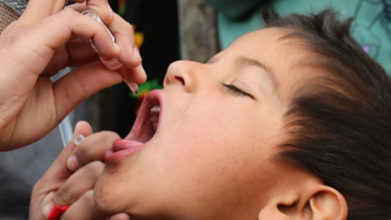World Polio Day: One Day, One Goal: End Polio.
At the dawn of the 32nd anniversary of the Global Polio Eradication Initiative - GPEI, born in 1988 from the joint action of the 5 partners: World Health Organization, UNICEF, U.S. Centers for Disease Control and Prevention (CDC), Rotary International and the Bill and Melinda Gates Foundation, World Polio Day is celebrated on 24 October 2020, and, with the aim of promoting the definitive eradication of wild poliovirus strains worldwide, each year commemorates the goals pursued, awareness achieved and future prospects.

In the history of medicine and the prevention of infectious diseases, the fight against poliomyelitis has always been a marathon, and currently we are running the final sprint. Even in a context such as the present one where the world is being put to the test by the COVID-19 pandemic, we cannot lose sight of the goal of globally eradicating this disease; and despite the fact that recently the African Region has also been certified free of the wild poliovirus polio is unfortunately still a tragic reality that continues to claim many victims both in terms of disability and mortality, with a higher incidence in children under five years of age.
Polio is an acute and extremely contagious infectious disease, caused by viruses (Polio virus) belonging to the genus Enterovirus, which act on the nervous system affecting the neural cells and inducing a paralysis which, in the most serious cases, can be fatal. Poliovirus only infects humans and the contagion occurs via the faeco-oral route, through ingestion of contaminated water or food, or through saliva and droplets emitted when sick people or healthy carriers cough or sneeze. Regardless of the mode of transmission, Poliovirus enters the body through the mouth and multiplies in the oropharynx, tonsils, lymph nodes of the neck and gastrointestinal tract (small intestine).
Human cells are equipped with specific protein receptors to which polioviruses can adhere and thus penetrate susceptible cells. The infection evolves through cycles of viral replication, leading to the destruction of infected cells. Once the infection is established, polioviruses can reach the central nervous system through the blood-brain barrier, through the blood stream or through nerve fibres. Viral multiplication destroys motor neurons which, by not regenerating, lead to the functional inability of the affected muscles, although in some rare cases it is possible to fully recover muscle function.
Since there are no medicines that can cure this disease, the only way to defend against it is through vaccination. Since 1996, thanks to the eradication campaign, 9 billion doses of the oral vaccine have been distributed, 1.8 million cases of child paralysis have been avoided and 180,000 lives have been saved. Now, as WHO points out, it is essential that countries continue to be even more vigilant: if vaccine prevention is neglected, wild Poliovirus could return and spread. Poliomyelitis caused by the wild virus is still endemic in Afghanistan and Pakistan and the persistence of epidemic outbreaks, even if located in geographically limited areas, constitutes a risk for the population as a whole.
However, the policies and planning of surveillance activities and strategies put in place to maintain the Polio-free state continue to persevere in order to achieve the ultimate goal of global Poliovirus eradication. It is in this context that Rotary International, to commemorate the birth of Jonas Salk, the medical researcher and patriarch of the first polio vaccine, established World Polio Day, which has been celebrated for over 20 years.
On 24 October each year, organisations around the world, such as Rotary International, the World Health Organization, UNICEF, the U.S. Centers for Disease Control and Prevention (CDC), and the Bill and Melinda Gates Foundation, along with all districts, associations and member clubs, celebrate the professionals, volunteers and organisations involved in the global fight against polio and their efforts to eradicate it. Along with this commemorative note, this important celebration aims to raise awareness of the importance of ending any existing outbreaks, stopping the virus and raising funds to achieve these goals.
This year, the leitmotif chosen for the occasion is "Stories of progress: past and present", selected to acknowledge and commemorate the progress made so far in the fight against poliomyelitis and to acknowledge the efforts of all actors involved in the process.
In this context, it is necessary to underline the continued generosity and shared commitment of donors whose contribution over the years has yielded extraordinary results. Over the past two decades, countless Rotary members from around the world have worked together to raise funds, immunise children, advocate with national and local government authorities, and raise public awareness of the importance of vaccination, enabling the Global Polio Eradication Initiative (GPEI) to respond effectively to and stop the re-emergence of polio.
In this context, Vaccinarsinsardegna.org asks its users to reflect on the enormous efforts made by the workers. Each day, on the front line in the eradication of polio, they continue to work in difficult and sometimes exhausting conditions to reach every child by offering, through the polio vaccine, the chance to survive this terrible condition.
We take the opportunity, therefore, to call for a conscious adherence to vaccinations and boosters set out in the vaccination schedule, including obviously the vaccination against poliomyelitis. In this regard, it should be noted that the schedule of the anti-polio vaccine for Italy provides for the administration of 3 doses of inactivated polio vaccine (IPV) during the first year of life, with two further boosters in the 6th, and between the 12th and 18th year of life.
Among the many events at national and international level, the Rotarian associations of Sassari have organised two important initiatives: the first "A good coffee for a good cause: END POLIO" which will be held on Friday, October 23, 2020 from 8.30 to 12.30 at the Bar Giardino, Via Roma 55, and the second "World Polio Day: End Polio Now" which will be held on the World Polio Day itself (October 24) at the Bar Academia Caffè, Via Torre Tonda 11. All are invited to participate in both initiatives to enjoy a cup of coffee and donate a polio vaccine by purchasing a ‘suspended coffee’.
https://www.who.int/health-topics/poliomyelitis#tab=tab_1


